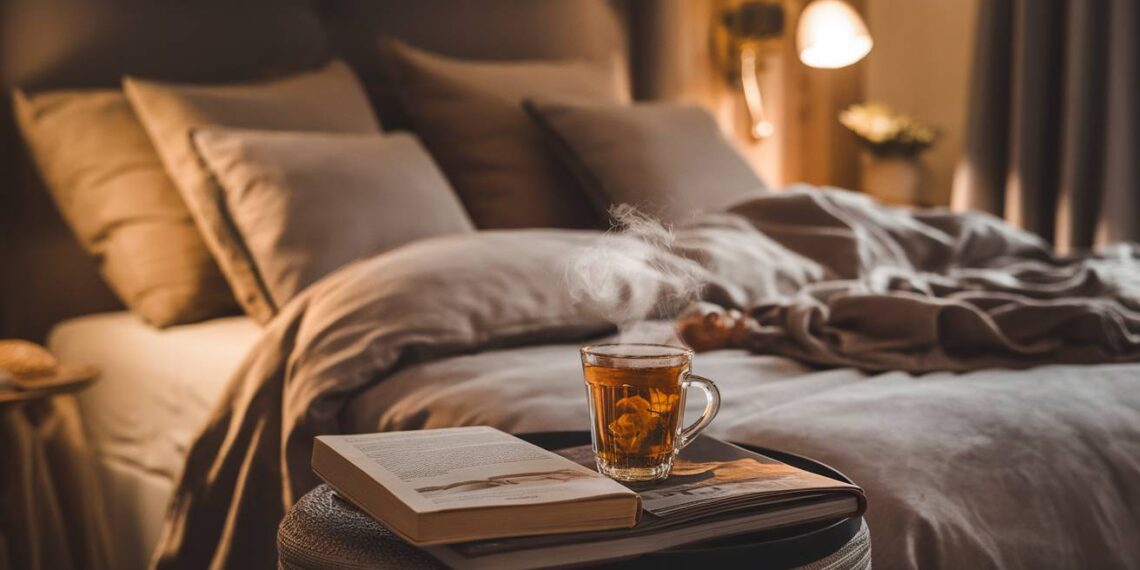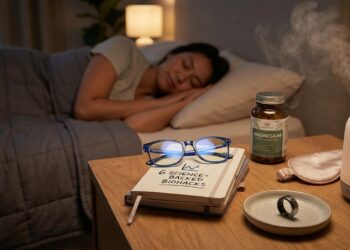Can’t seem to drift off no matter how hard you try? Or maybe you wake up feeling like you haven’t slept at all? Unlocking the secret to restful nights doesn’t have to be a dream. By mastering sleep hygiene, you can transform your sleep patterns and wake up feeling refreshed and energized.
Let’s explore how simple tweaks to your habits and environment can lead to the blissful sleep you’ve been longing for.
Key Takeaways
- Understanding Sleep Hygiene: Crafting the perfect recipe for great sleep through consistent habits and a cozy environment.
- Creating a Peaceful Sleep Zone: Optimizing your bedroom’s temperature, noise, light, and comfort to enhance sleep quality.
- Establishing a Routine: Maintaining a consistent sleep schedule and relaxing wind-down rituals to regulate your body’s clock.
- Lifestyle Habits for Better Sleep: Incorporating physical activity and a balanced diet to promote better sleep.
- Managing Stress and Anxiety: Employing stress-busting techniques like deep breathing and meditation to ease into sleep.
- Technology and Sleep: Limiting screen time before bed and creating tech-free zones to improve sleep patterns.
- Sorting Out Sleep Woes: Recognizing common sleep troubles and seeking professional help when needed.
- Reviewing Sleep Hygiene Practices: Tracking sleep patterns and adjusting habits for continuous improvement.
Understanding Sleep Hygiene
What is Sleep Hygiene?
Sleep hygiene isn’t about cleanliness; it’s about crafting the perfect recipe for great shut-eye. It’s all those little changes in your life, like what you eat before bed, how you set up your room, and what you do right before hitting the sack, combined to help you catch those Z’s. These tweaks can transform not just how you sleep but how vibrant and healthy you feel every day. Imagine waking up feeling like you conquered the world! That’s what solid sleep hygiene aims to do.
Think of it like this: a fixed bedtime, a cozy sleep space, and chill-out rituals before bed are your new best friends. Seriously, focusing on sleep hygiene can be a game-changer, especially if tossing and turning or broken sleep sound personal woes.

Importance of Sleep Hygiene Practices
So, why does sleep hygiene matter? It’s like the secret sauce to living your best life. Let’s spill the beans on why focusing on good sleep practices is a must:
| Benefit | Description |
|---|---|
| Top-Notch Sleep | Getting into a sleep groove can help you snooze deeper and wake up refreshed. |
| Brain Booster | Catching quality sleep helps you concentrate like a pro, remember stuff, and think through your day. |
| Mood Magic | Enough sleep means saying bye-bye to grumpiness and feeling steady and happy. |
| Health Helper | Good sleep’s got your back with weight goals, keeps nasty diseases away, and helps your immune system stay buff. |
| Power Up | Feeling rested means you’re ready to rock with energy and productivity all day long. |
Bringing sleep hygiene into your daily routine isn’t just about fixing sleep glitches; it’s paving the way for a more energetic you! Little changes like bedtime rituals and keeping a consistent sleep schedule can make a huge difference. Plus, learning about sleep debt can remind you why catching up on snooze time is vital. And hey, if you’re game to tweak your sleep spot, things like a digital detox for sleep can really boost your sleep game.
Creating a Peaceful Sleep Zone
The way you set up your room can help you sleep like a baby, or it could turn you into a night owl. Making your sleeping space a chill zone is really important for getting that good snooze you deserve.
“A good laugh and a long sleep are the best cures in the doctor’s book.” — Irish Proverb
The Perfect Sleep Environment
Certain things can make a bedroom the perfect place to catch some Z’s. Here’s a cheat sheet for turning your sleep space into the ultimate snooze fest:
| Thing to Tweak | What to Do |
|---|---|
| Room Temperature | Keep it cool, somewhere between 60-67°F (15-19°C) |
| Noise Level | Quiet is key; try white noise or earplugs if needed |
| Light Situation | Block out light with dark curtains; use soft lights at night |
| Air Quality | Let fresh air in and maybe use an air purifier |
| Clutter-Free Scene | Keep the room clean to help your mind relax |
When your room’s peaceful, your body and brain chill out too, making good sleep much easier.

Bedding and Mattress: The Sleep Heroes
Bedding and a good mattress are like the sidekicks of a good night’s sleep. The right mattress can help your body feel great and lead to better rest. Check out these mattress details:
| Type of Mattress | How Soft or Firm? | How Long It Lasts |
|---|---|---|
| Memory Foam | Medium to firm | 7-10 years |
| Innerspring | Firm or plush (up to you) | 5-10 years |
| Latex | Medium to firm | 8-12 years |
When picking a mattress, think about what you like—for example, do you prefer squishy or stiff? Don’t forget that good sheets, pillows, and blankets help too. Also, it’s worth checking out different bedtime rituals to help you relax even more.
By getting your sleep zone and bedding just right, you’re all set for awesome sleep. This means you’re on track to fix sleep problems like sleep debt and make sleep quality a regular thing.
Establishing a Routine
Alright, listen up! Want better sleep? It’s all about setting a routine. When you tuck yourself in at the same time every night and unwind before bed, you’re giving yourself the gift of dreamy sleep.
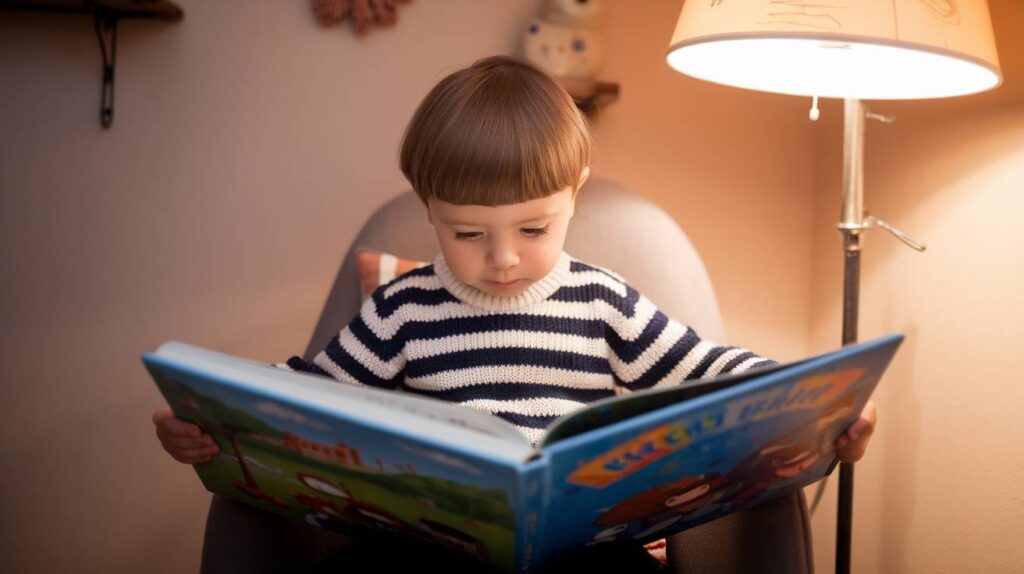
Consistent Sleep Schedule
Holding down a steady sleep schedule is like training your body to get used to good quality sleep. The trick is to hit the hay and rise and shine around the same time every day, even on those lazy weekends. This steadiness keeps your body’s natural sleep cycle, or circadian rhythm, in check.
Here’s a quick cheat sheet on how much shut-eye you should be getting based on your age:
| Age Group | Recommended Sleep (hours) |
|---|---|
| Tiny Tots (0-3 months) | 14-17 |
| Little Hobbits (1-2 years) | 11-14 |
| Mini Humans (3-5 years) | 10-13 |
| School Flock (6-13 years) | 9-11 |
| Teenage Dreamers (14-17 years) | 8-10 |
| Busy Adults (18-64 years) | 7-9 |
| Wise Owls (65+ years) | 7-8 |
Need a little nudge to stick to this schedule? Set those phone alarms or get yourself a neat sleep app. These tools can help nip that pesky sleep debt from chaotic sleep habits in the bud.
Wind-Down Routine Before Bedtime
Now, before you hit the sack, it’s time to chill out. This “wind-down” thing lets your body know it’s almost snuggle time. Here are some chill vibes you can try:
- Dive into a good book
- Get groovy with some mindfulness exercises
- Stretch it out with some light yoga
- Let soothing tunes or white noise lull you
Turning off those screens at least half an hour before zonking out is key. That sneaky blue light can mess with your sleep rhythm. Need a trick up your sleeve? Try that 4-7-8 breathing thing—it really does wonders to calm the mind.
Here’s a little structure for your pre-bed ritual:
| Activity | Time You’ll Spend |
|---|---|
| Flip through a book | 15-20 minutes |
| Meditate your worries away | 5-10 minutes |
| Yoga bendy time | 10-15 minutes |
| Scribble some thoughts | 5-10 minutes |
Getting into a relaxing nighttime groove along with a regular snooze schedule can really step up your sleep game. Plus, there are always more tidbits to discover, like fun bedtime rituals or night habits that’ll set you up for solid slumber. Go ahead, catch those Z’s.
Lifestyle Habits for Better Sleep
Falling asleep with ease can often feel like a stroke of luck, but guess what? You can actually stack the odds in your favor by adopting a few nifty lifestyle tweaks. These changes aren’t about turning your life upside-down, they’re more like gentle shoves towards the land of nod.
“Your future depends on your dreams, so go to sleep.” — Mesut Barzani
Importance of Physical Activity
Get moving! A little physical activity can do wonders, not just for keeping you in shape, but also for hitting the hay without a hitch. Exercise is like a magical potion that melts away stress and anxiety, helping you clock off with fewer interruptions. And, bonus, it ramps up those zzzz-inducing hormones like melatonin.
Timing’s key though. A brisk jog at sunset? Perfect. A late-night spin class? Not so much. Keep the sweat sessions moderate and during daylight for the best shot at snooze success.
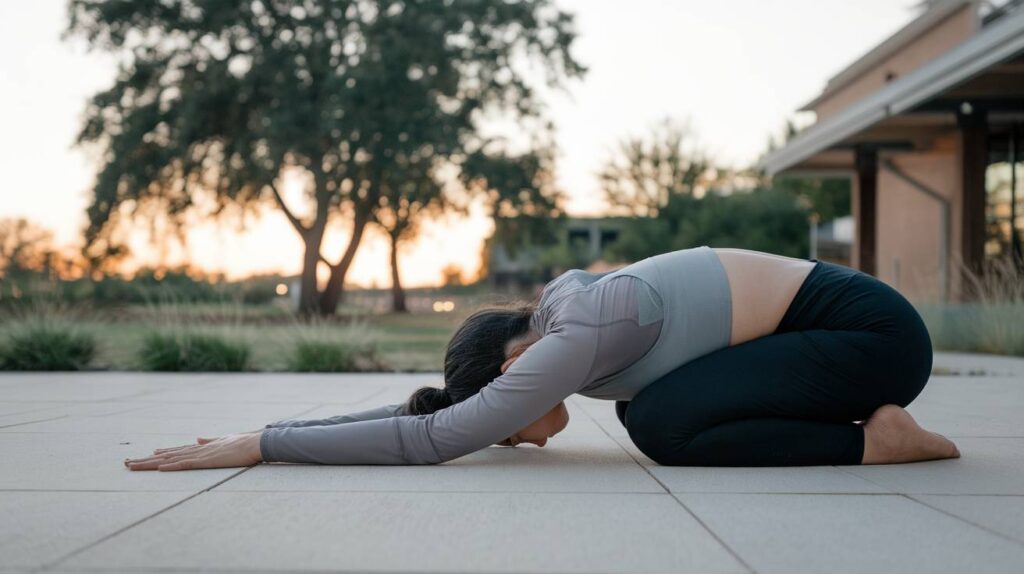
Recommended Physical Activity Guidelines
| How Much Off the Couch Time | Weekly Total | Why Bother? |
|---|---|---|
| Easy Peasy (take a walk) | 150 minutes | Catch more sleep waves |
| Slightly Sweaty (dive in the pool) | 75 minutes | Nod off with ease |
| Heart-Pumping (lace-up for a run) | 75 minutes | Sink into deeper dreams |
Curious to know more? Peek at our take on how breaking a sweat makes your sleep sweeter right here.
Balanced Diet and Its Impact on Sleep
Here’s the scoop: what you’re munching on during daylight can be the secret sauce to night-time bliss. Think fruits, veggies, whole grains – your basic wholesome pantry heroes – these are the MVPs for more than just your waistline.
Snack time can tip the scales, too. Magnesium or tryptophan-rich bites (yeah, turkey and spinach, we’re looking at you) can be your sleepy time allies. But sneaky spice-laden midnight snacks? Not so friendly if you’re after uninterrupted rest.
Foods for Better Sleep
| Munchies of Choice | Sleepy-time Perks |
|---|---|
| Whole Grains (hello, oatmeal) | Boosts that feel-good vibe |
| Lean Protein (gobble up some turkey) | Packs sleep-friendly tryptophan |
| Magnesium All-Stars (think greens like spinach) | Sets the relaxation mode |
| Comforting Brews (sip chamomile tea) | Lulls you into slumber |
If bedtime bites are your jam, you’ll want to check out more evening eats for a peaceful drift off right here.
So, there you have it. A dash of exercise and a sprinkle of smart food choices, and you’re on your way to crafting a sleep-friendly lifestyle that’s way more than just a dream.
Managing Stress and Anxiety
Isn’t it wild how a little stress can tangle up your sleep? That late-night overthinking’s got us all counting sheep till morning! Figuring out how to chill and understanding how your mood can mess with your shuteye is the key to snoozing like a pro.
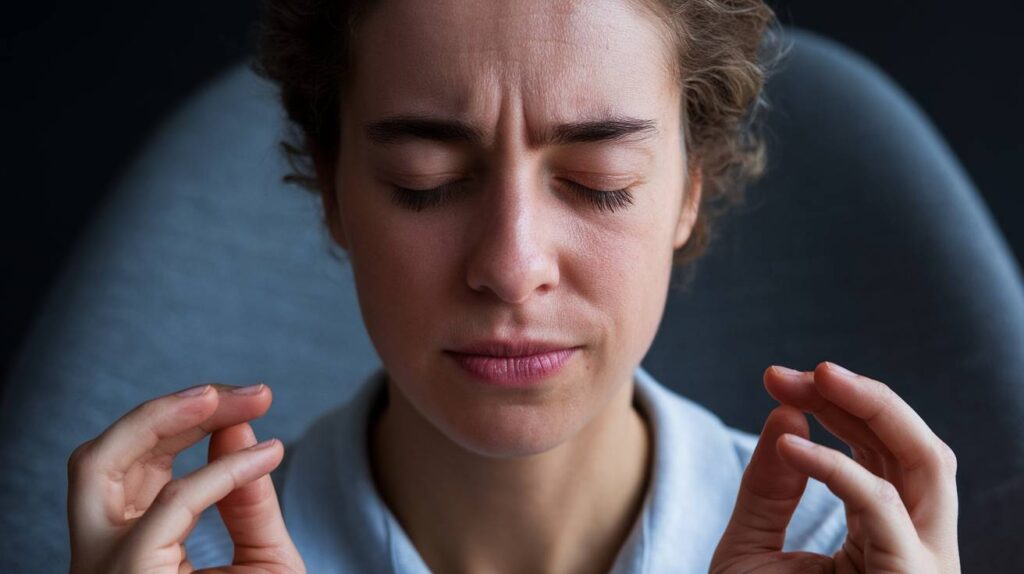
Stress-Busting Hacks
Let’s be real: finding ways to kick stress to the curb before bedtime helps you hit the pillow with peace of mind. Check out some practical ideas:
| Trick | What It Is |
|---|---|
| Deep Breathing | Take slow, big breaths to dial down the stress and give relaxation a go. That 4-7-8 breathing technique? A game-changer. |
| Zen Meditation | Pushing out those nagging thoughts with mindfulness—try a guided app for a mental spring clean. |
| Muscle Mellowing | Tense those muscles, then let them go limp to say bye-bye to any tight spots. |
| Scribbling Your Stress | Pour your thoughts onto paper. It’s like venting to a diary. Sleep journaling can seriously unknot your brain. |
| Chill Yoga | A bit of easy yoga or stretching releases that daytime tightness. |
Stirring these into your bedtime routine makes your sleep area feel as comforting as a soft blanket.
Why Your Mind Messes With Sleep
Your mental state’s got a huge say in how well you sleep. Worries or the blues can throw a wrench in your snooze schedule. Sorting these issues out might just be the trick to better nights.
| How the Mind Affects Sleep | What’s Going On |
|---|---|
| Anxiety’s Grip | Those anxiety vibes can have your brain bouncing like a ball. Try these evening habits for better sleep for a smoother touchdown. |
| Depression Drums | It can flip your sleep routine on its head. Sticking to a consistent sleep schedule, though, helps keep things steady. |
| Stress Surge | Stress eats into your chill time, often stealing sleep. Bedtime rituals can ease you into dreamland. |
Knowing your mental health’s hold over your sleep gives you the power to make some healthy changes. If the struggle continues, consulting a pro or diving into CBT-I for sleep could be the lifeline you need.
Technology and Sleep
Our gadgets are like an extra limb these days, but they’ve got a sneaky way of messing with our shut-eye. So figuring out how they affect us can be a game changer for anyone looking to catch some quality Zs.
Impact of Screens Before Bed
Ever tried hitting the hay but couldn’t unplug from your phone? You’re not alone. Those glowing screens actually mess with our sleep mojo. That’s because they give off blue light, and blue light’s a little punk that throws a wrench into our body’s sleep-wake routine. This all-important rhythm, known as the circadian clock, tells us when we should be knocked out or wide awake.
Studies show that cutting down on device use before bed can lead to much sweeter dreams. Let’s break it down:
| Screen Time (Minutes Before Bed) | Sleep Quality Effect |
|---|---|
| 0-30 | Barely noticeable |
| 31-60 | Kind of messes with you |
| 61+ | Gets in the way big time |
The takeaway? Ditch the screens an hour before you hit the sack. For more tips on kicking that tech habit for better sleep, check out digital detox for sleep.
Creating Tech-Free Zones
Time to carve out some no-tech zones at home! Make some places, like your bedroom, a gadget-free safe haven. Trust me, it helps get the chill vibes going and makes falling asleep easier.
Here’s what tech-free zones bring to the table:
- Easier wind-down time before sleep
- Less temptation to doom-scroll
- More focus on chill-out activities like reading or meditation
Building a comfy nook without electronics can work wonders for your sleepy time routine and overall sleep bliss. Looking for more ways to set the mood for snoozing? Peek at bedtime rituals and evening habits for better sleep.
Setting some rules with your tech is key to getting those peaceful nights we all dream of.
Sorting Out Sleep Woes
Sleep problems can really mess with a person’s day-to-day life. Getting a grip on common sleep troubles can help folks find their way to better sleep habits and, ultimately, better zzz’s.
Sleep Troubles to Know About
Loads of sleep issues keep folks from getting a solid night’s rest. They might make it tough to nod off, stay asleep, or wake up feeling like a million bucks. Here’s a quick rundown of some usual suspects:
| Sleep Trouble | What It Is |
|---|---|
| Insomnia | Can’t get to sleep or keep waking up, leaving you wiped out during the day. |
| Sleep Apnea | Breathing starts and stops, waking you up a bunch of times. |
| Restless Legs Syndrome | A leg-moving itch you can’t ignore, often comes with uncomfortable feelings. |
| Narcolepsy | Falling asleep at the wheel. Or the couch. Or… whenever, really. |
| Circadian Rhythm Bumps | The body’s clock’s out of whack, and your sleep schedule’s paying for it. |
Knowing what’s up with these troubles helps when it’s time to get them sorted and to hit the hay with style, maybe by sticking to a regular bedtime or creating some calming nighttime habits.
Reaching Out For Help and Handy Stuff
If sleep troubles refuse to take a hike, seeing a professional can be smart. The pros can figure out what’s going wrong in your sleep saga. Here’s a peek at some help and tools:
| Help & Tools | What They Offer |
|---|---|
| Sleep Clinics | Places that know their sleep stuff and check yours out top to bottom. |
| Cognitive Behavioral Therapy for Insomnia (CBT-I) | Get your head and habits straight to sleep better. More on this here. |
| Sleep Journals | Keep tabs on your sleep to spot what’s up or what’s down. Get journaling tips here. |
| Chillout Apps | These apps help you unwind and catch more z’s. Find good ones here. |
Tackling sleep drama is a biggie for staying upbeat and healthy. Spotting a pesky sleep trouble and grabbing hold of some support can make a world of difference. Little tweaks in how you crash for the night can do wonders—so peek at our evening routines for better nod-offs and scope out how to handle that sleep debt.
Reviewing Sleep Hygiene Practices
Final step in improving those sweet dreams comes with checking out what you’ve been doing in the sleep department and tweaking things to rest better. It’s all about marking down sleep patterns and switching up habits to catch some sound sleep.
Tracking Sleep Patterns
Writing down how you snooze can clue you in on how you’re sleeping and what needs fixing. Keeping a journal is handy for this – jot down when you hit the hay, get up, and how well you slept. This way, you can spot any quirks.
Here’s a basic sleep chart for a week:
| Day | Bedtime | Wake Time | Sleep Quality (1-10) |
|---|---|---|---|
| Monday | 10:30 PM | 6:30 AM | 7 |
| Tuesday | 11:00 PM | 6:45 AM | 6 |
| Wednesday | 10:00 PM | 6:00 AM | 8 |
| Thursday | 10:45 PM | 6:15 AM | 5 |
| Friday | 12:00 AM | 7:00 AM | 4 |
| Saturday | 11:30 PM | 7:30 AM | 6 |
| Sunday | 10:15 PM | 6:45 AM | 9 |
Checking out this info helps you see what’s working or not with your sleep. Adding in stuff like bedtime rituals and evening habits for restful nights can help.
Adjusting Habits for Better Sleep
Changing up your usual routine can make a world’s difference in how well you sleep. Here’s a few things to try:
Same Sleep Routine: Stick to going to bed and waking up ’round the same time every day – it helps tune your body clock.
Cut Back Screen Time: Dimming the screens before you turn in is a smart move. Creating no-gadget zones and trying out a tech detox for sleep can improve sleep.
- Exercise: Moving around and breaking a sweat boosts sleep quality. Check out more on exercise and how it helps sleep.
- Food and Drinks: Watching what you consume, especially before bed, can lead to a snooze boost. Eating balanced can also cut down sleep debt.
Chill Out: Relaxation exercises like the 4-7-8 breathing trick ease anxiety, making it simpler to nod off.
Watching your sleep trends and making some tweaks can polish up your sleep hygiene and improve your sleep game. For some techy insights, look into sleep trackers to keep a healthy sleep schedule.
Main Tips
- Stick to a Consistent Sleep Schedule: Go to bed and wake up at the same time every day, even on weekends.
- Create a Relaxing Bedtime Routine: Engage in calming activities like reading or gentle stretching before bed.
- Optimize Your Sleep Environment: Keep your bedroom cool, dark, and quiet; invest in comfortable bedding.
- Limit Exposure to Screens: Avoid screens at least an hour before bed to prevent blue light from disrupting your sleep.
- Be Mindful of Your Diet: Avoid heavy meals, caffeine, and alcohol close to bedtime.
Final Thoughts
Better sleep starts with better habits. By prioritizing sleep hygiene, you’re investing in your health, mood, and productivity. Remember, every night is an opportunity to practice and perfect these habits. Sweet dreams await!
Conclusion
Transforming your sleep habits is more than possible—it’s within your reach tonight. By understanding sleep hygiene and making mindful tweaks to your environment and routine, you’re setting the stage for restful nights and energized mornings. Remember, every small change brings you one step closer to the dreamy sleep you’ve been longing for.
FAQs
What is sleep hygiene, and why is it important?
Sleep hygiene refers to the practices and habits that promote consistent, uninterrupted sleep. It’s crucial because good sleep enhances your mood, boosts cognitive performance, and supports overall health.
How can I create a peaceful sleep environment?
Optimize your bedroom by keeping it cool (60-67°F), quiet, and dark. Invest in a comfortable mattress and pillows, declutter your space, and consider using white noise or blackout curtains.
What are effective wind-down routines before bedtime?
Engage in relaxing activities like reading, gentle yoga, or meditation. Limiting screen time at least an hour before bed can also help signal your body it’s time to sleep.
How does lifestyle impact sleep quality?
Regular physical activity and a balanced diet improve sleep quality. Avoiding heavy meals, caffeine, and alcohol close to bedtime can also make falling asleep easier.
Why should I limit technology use before bed?
Screens emit blue light that can interfere with your circadian rhythm, making it harder to fall asleep. Creating tech-free zones and unplugging before bed promote better sleep.
Resources
- National Sleep Foundation — Comprehensive sleep health information.
- American Academy of Sleep Medicine — Resources on sleep disorders and treatments.
- Sleep Education by AASM — Educational materials on sleep health.

